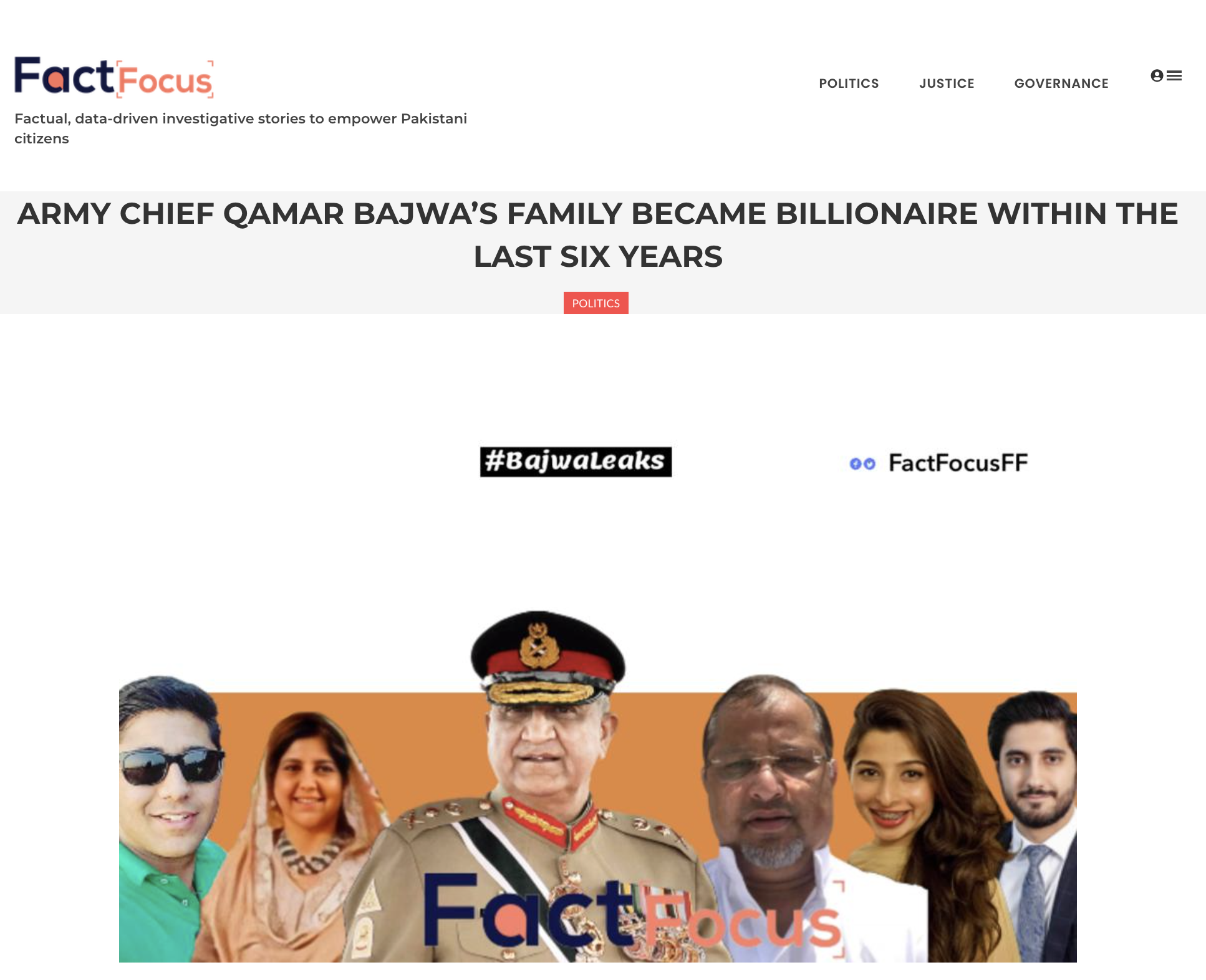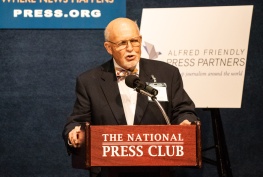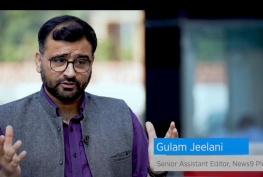During general’s waning days of power, government tries to block former Fellow’s exposé
By David Reed, Alfred Friendly Program Director
In Pakistan, every investigative reporter knows that exposing military misdeeds can get you censored, fired, beaten up — even killed.
No one knows those consequences better than Ahmad Noorani. The Alfred Friendly alumnus was fired, blackballed, and nearly beaten to death for reporting about the military’s dominance over civilian affairs, along with the unreported assets of leading politicians ultimately under the military’s control.
So Noorani wasn’t surprised by what happened when he published an exposé in late November that used leaked tax documents to show that the family of Pakistan’s most powerful military chief accumulated nearly $56 million during his six years in office.
Pakistani authorities blocked access to Noorani’s website inside the country and ordered an investigation into the leak of the personal financial documents.
None of the newspapers or broadcast outlets in Pakistan published or aired the blockbuster findings — which Noorani backed up with copies of the official tax documents that anyone could download from his U.S.-based website, FactFocus.com.
Voice of America and Bloomberg reported about Noorani’s findings, but VOA is blocked inside Pakistan and Bloomberg’s article was behind a paywall.
Noorani, who developed the website during his fellowship, knows that social media is harder to control.
He tweeted about his story and took readers to the English and Urdu versions. One tweet was read and shared by two million people, another by a million and several others by hundreds of thousands.
With encouragement from Noorani and his online supporters, people outside Pakistan took screenshots of the article, converted them to PDFs and distributed them through social media and emails. Others shot video of their computer screen while scrolling through the story and disseminated it that way.
Noorani and allies contacted the Committee to Protect Journalists, Reporters Without Borders and human rights organizations to let them know about the blockade of his website on Pakistan’s internet, and they put pressure on the government. After less than a day, FactFocus was unblocked.
“The government’s unfortunate first instinct, to censor the website, was a futile initial attempt to bottle up the story at a time of political uncertainty in Pakistan,” said Steven Butler, Asia Program Coordinator for the Committee to Protect Journalists.
Before Noorani left the country under duress in 2020, Butler interviewed Noorani several times for a special report on deteriorating press freedoms in Pakistan. Butler also wrote a letter supporting Noorani’s application for the J1 trainee visa he needed to join the Alfred Friendly fellowship program.
Butler said Noorani’s story “sharply undermines any notion that military leaders are selflessly protecting the nation and makes a mockery of the idea that only corruption by venal politicians is somehow responsible for Pakistan’s woes.”
Umar Cheema, an Alfred Friendly Fellow in 2008 who went on to found the Center for Investigative Reporting in Pakistan, called Noorani’s story “a bombshell.”
“The media industry is in crisis and groundbreaking work like this gives a reason to support investigative journalism,” Cheema said. “The story has generated a lot of resonance among the public. It is also a reminder for the high and mighty that gone are the days when they could afford to live above the law. This will keep haunting the outgoing army chief for years to come.”
“It’s a huge story,” said Anwar Iqbal, an Alfred Friendly Fellow in 1987 and now the Washington correspondent for Pakistan’s top newspaper, Dawn. “It will have a major impact on Pakistani politics. Combined with (former prime minister) Imran Khan’s campaign, it will force the army to review its involvement in politics.”
Dawn was the first major news outlet to put a toe across the military redline and publish a story about the FactFocus revelations, leading with the government’s official investigation into the leak but including links to Noorani’s website and his article.
“The military considers this an attack on the institution,” Noorani said.
But he added that overall political awareness for the civilian supremacy and rule of law and struggle of political parties has weakened the military.
A few days after publication, Gen. Qamar Bajwa’s second three-year term ended and he handed over power to a new army chief named by Prime Minister Shebaz Sharif.
Butler from CPJ said “with Bajwa’s retirement, it may now be possible for the story to be fully vetted. Pakistani voters and taxpayers have a right to know how military leaders use their positions to accumulate vast wealth.”
In 2020 when he launched FactFocus, his first story investigated a retired general who was chairman of the country’s massive China-financed infrastructure project and a special assistant to the prime minister. Noorani and his staff revealed that the growth of the family’s business empire in the United States and later in Pakistan directly matched the general’s rise in power. That general resigned from the government position shortly after the exposé.
In another blockbuster last year that went viral, Noorani obtained audio of former chief justice Saqib Nisar giving orders to convict former premier Nawaz Sharif and his daughter Maryam Nawaz. Fact Focus also reported about the tax evasion and non-declaration of assets by then-Prime Minister Imran Khan and released his lifetime tax record, a first in the country’s journalism history.
Noorani said he and his colleagues will continue looking into possible corruption involving government and military leaders, including Bajwa’s successor. “It’s what I do.”
[Note: Noorani will be a panelist for an Alfred Friendly webinar on website development projects by Fellows on Friday, Dec. 1 at 11 am CST]






